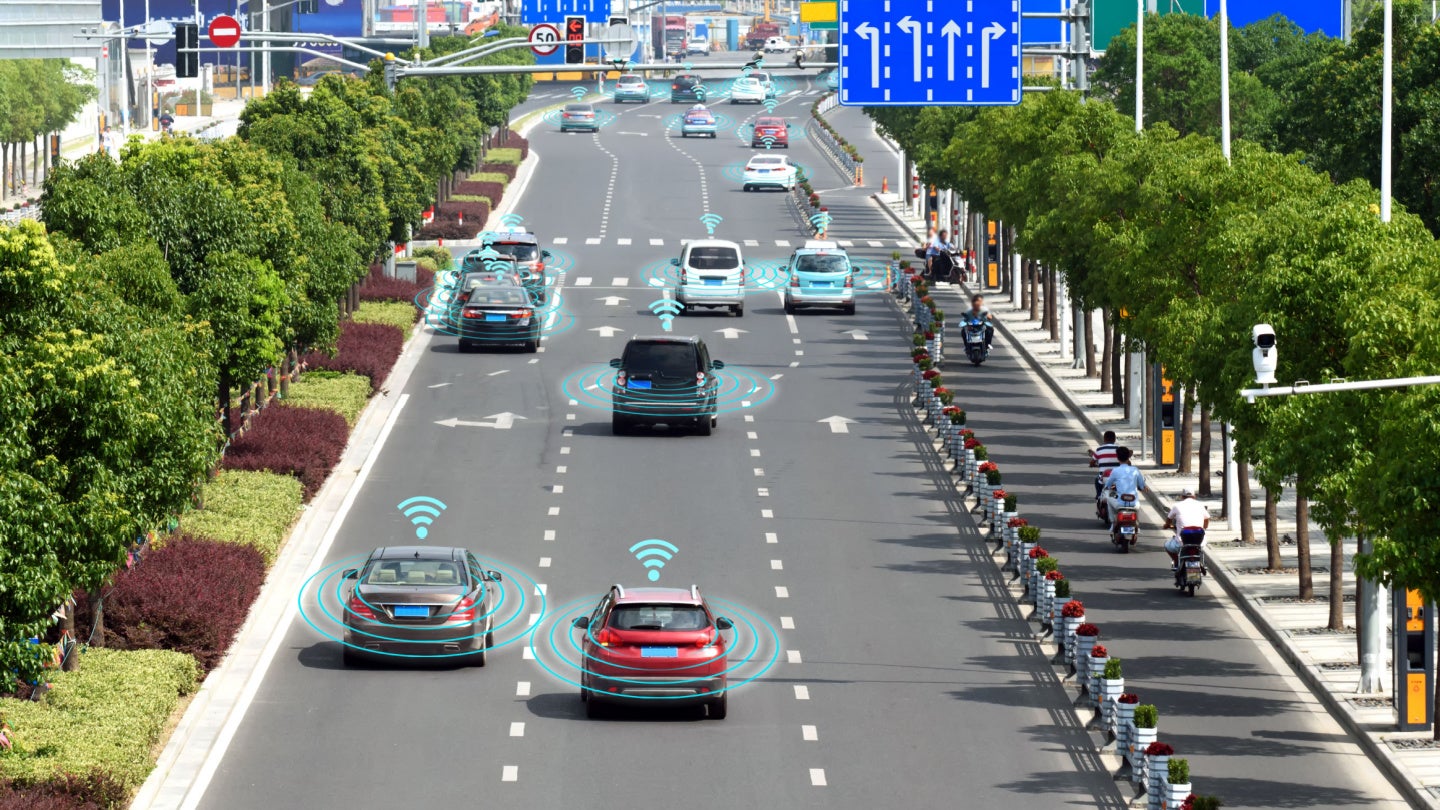
The UK’s auto industry trade association – the SMMT – says the UK rollout of connected and automated mobility (CAM) technology is poised to deliver annual economic benefit to Britain as high as £66 billion by 2040.

Discover B2B Marketing That Performs
Combine business intelligence and editorial excellence to reach engaged professionals across 36 leading media platforms.
Moreover, it says a new report finds the tech could help save 3,900 lives and prevent 60,000 serious accidents – while adding 342,000 additional jobs, with 12,250 directly in automotive manufacturing by 2040.
The trade association also called for the UK government to introduce new legislation in this parliament to boost the sector or ‘risk losing the opportunity’.
The report concludes that if connected and automated mobility (CAM) technology is adopted in a range of commercial applications, from self-driving cars and logistics vehicles to automated buses, taxis, shuttles and even tractors – there is a major economic gain.
CAM tech enables vehicles to drive without human intervention while connecting with each other and surrounding infrastructure. The SMMT maintains that boosting rollout would not only cement the UK’s status as a global leader in this next gen tech, but it would also create some 342,000 additional jobs across the economy from now to 2040, with 12,250 in automotive manufacturing. It is also estimated that 3,900 lives could be saved, too, with 60,000 serious accidents prevented across the same period, all while delivering potentially lower insurance premiums, less stressful journeys and greater travel freedom for those with disabilities. Businesses could benefit from more efficient movement of goods and industrial processes.
The SMMT says that with a significant public-private investment of more than £600 million already committed to CAM testing since 2015, government and industry ‘must now create the conditions to safely and responsibly deploy the technology across passenger cars, services and commercial and industrial vehicles’. While Britain is already well placed to implement CAM technology into passenger cars, significant new opportunities for growth exist in eight other markets, ‘thanks to the ability of CAM tech to deliver efficiency and productivity gains in everyday transport and business activities’.
The report, summarising a study by KPMG and funded by Innovate UK, with support from the Automotive Council and Zenzic, reveals that among these markets, on-road logistics has the potential to be the largest, with annual revenue of £15.2 billion by 2040 from rolling out CAM tech in the sector – underscoring the importance of enabling these features in commercial HGVs and vans used in everything from long distance haulage to last mile home deliveries.
Implementing CAM tech in on-road passenger services, such as buses, taxis and ride-hailing, with a possible annual revenue of £3.7 billion, and off-road logistics, including vehicles used in warehouses, ports and airports, worth £2.3 billion per year by 2040, rank as the second and third largest markets. Some of the earliest deployment opportunities could also be found in the mining and agricultural sectors, given the nature of these environments with little or no public access.
The SMMT says unlocking the significant benefits of safe and responsible CAM tech adoption is ‘now highly dependent on government action. This means enacting relevant regulatory and legislative reforms urgently, with a particular focus on tabling new legislation on self-driving vehicles in the remainder of this Parliament.’
The SMMT maintains that all barriers to regulatory reform must be removed and this needs to be combined with an ‘ambitious strategy to support private sector investment and stimulate innovation-driven growth, equip workers with essential digital and software skills through upskilling and reskilling initiatives, and engage the public through comprehensive education and communication programmes.’
Mike Hawes, SMMT Chief Executive, said: “While fully automated road journeys are still some way off, advances in connected and automated mobility technology means they’re within our future – presenting a significant opportunity to revolutionise transport in the UK. Government must work with all stakeholders to implement the necessary framework needed to deliver this exciting revolution swiftly and effectively, ensuring that consumers can reap the lifesaving and cost saving benefits. Failing to do so risks leaving the UK in the slow lane, jeopardising our competitiveness and impeding growth and job creation.”
Mike Biddle, Innovate UK Executive Director for Net Zero, said: “This landmark study shows the huge prize that developing and deploying connected and automated mobility in the UK could deliver, with annual economic benefits as high as £66 billion by 2040 and an estimated additional 342,000 additional jobs overall in the economy.”
Ian Constance, Zenzic Chief Executive, said: “The UK continues to be at the forefront of global development and deployment in connected and automated mobility. We have focused on critical elements of the supply chain in which the UK has great strengths such as self-driving software, cyber security, testing and validation and simulation. This report outlines the size of the opportunity for the UK CAM sector and calls for greater engagement across all relevant sectors.”
Adrian Hallmark, Automotive Council UK joint Chair and Bentley Motors Ltd CEO, said: “Whether moving people or goods via highly automated cars, buses, trucks, construction machinery or material handling equipment, the deployment of CAM represents a once in a generation economic, societal and environmental opportunity for the UK. It has the potential to boost the whole transport sector, creating new supply chains, manufacturing and deployment opportunities. It could also help transform road safety, enable accessible transport, and deliver reduced energy consumption for environmental benefit through smoother, more efficient driving.
“The automotive sector is ready to build this exciting transport future and to deliver tangible benefits for the UK. The Automotive Council welcomes this latest report and looks forward to agreeing the interventions required to leverage the opportunities presented.”






